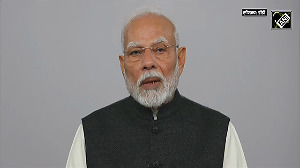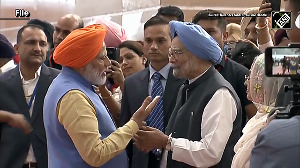At his inauguration in 1981, Ronald Reagan said "In this present crisis, government is not the solution to our problem; government is the problem."
The wheel has turned. Barack Obama assumes office with the U.S. government having more direct control over business and the economy than at any time since Reagan started his far-reaching crusade to shrink the federal government.
In that sense, the advent of Obama marks an end to the Reagan era.In reality, it will mark a new phase. Ever since it became clear that the financial system was going to require substantial government intervention, it has been fashionable to say that America has privatized reward but socialised risk.
Jack Bogle, the founder and former CEO of mutual fund giant The Vanguard Group, told Forbes recently that what America now has is "not free enterprise, it is fettered enterprise."
What most Americans believe their government should give them, however, is enterprise that is fettered only to the greater degree necessary to stop it from running wild. Though more Americans now work in government than manufacturing, hardly any of them--and certainly no one who remembers or experienced the shortages and hardships of the Soviet era that Reagan was instrumental in ending--seriously proposes that the US should be a centrally planned economy.
Nor do many Americans see much merit in the government owing and operating what Lenin once called the "commanding heights of the economy"--energy, iron and steel, transport, utilities and communications. They have stood in enough lines at the post office.
Like Reagan ("it's not my intention to do away with government"), Americans on the whole don't believe in zero government. There are many areas in which government is seen as having a natural role as the provider of a public good--defense, education and transportation being three of the most obvious.
Reagan talked about making government work; working with Americans not over them; standing by their side not riding on their back. The Reagan promise was a government that provides opportunity, not smothers it.
Similarly, what Americans want from their government in regard to business is that it keeps it honest. They want the federal government to be the referee, not a player.
There are all sorts of lesson about prudential regulation to be drawn from the current financial crisis; there were failures of government policy and administration, as well as failures of the market. Fragmented agencies need to be brought together, better assessments of risk taken; special interests curtailed, perhaps even a financial equivalent to the Food and Drug Administration to vet the more exotic new products that Wall Street's financial engineers produce.
But government's proper roll was well defined before the crisis. There were laws against predatory lending on the books that were just not enforced. There were dubious financial practices that the Securities and Exchange Commission did not have the staff--or perhaps the will--to investigate. There were asleep-at-the-switch corporate directors who did not hold up their fiduciary responsibilities.
These are the modern-day equivalent of adulterating food or fixing the scales in the market to defraud the shopper. Americans expect government to have weights and measures inspectors. But they don't want the government to run the produce stall.
Economically, the Obama presidency will be judged on how well it delivers jobs and prosperity. The new president has said his reforms will be measured "by the jobs we create, by the energy we save, by whether America is more competitive in the world."
He has acknowledged that it will be private enterprise that will have to deliver most of that. Government has a role to play in making that happen, through such measures as diverse as a hefty stimulus package to kick-start growth to creating public-private business incubators that can grow sustainable new businesses nationwide for the longer-term.
Government has neither the resources, creativity or drive to do it alone. Few Americans expect it to. They fundamentally believe in the extraordinary dynamism and creativity of a capitalist system that prizes and encourages people who, in Abraham Lincoln's words, try to improve their lot in life--and thereby the lot of us all.
Here are some words that could come out of the mouth of President Obama on inauguration day: "This administration's objective will be a healthy, vigorous, growing economy that provides equal opportunities for all Americans, with no barriers born of bigotry or discrimination. Putting America back to work means putting all Americans back to work ...
All must share in the productive work of this "new beginning," and all must share in the bounty of a revived economy. With the idealism and fair play, which are the core of our system and our strength, we can have a strong and prosperous America, at peace with itself and the world."
They were said by Ronald Reagan on inauguration day 1981.







 © 2024 Rediff.com -
© 2024 Rediff.com -